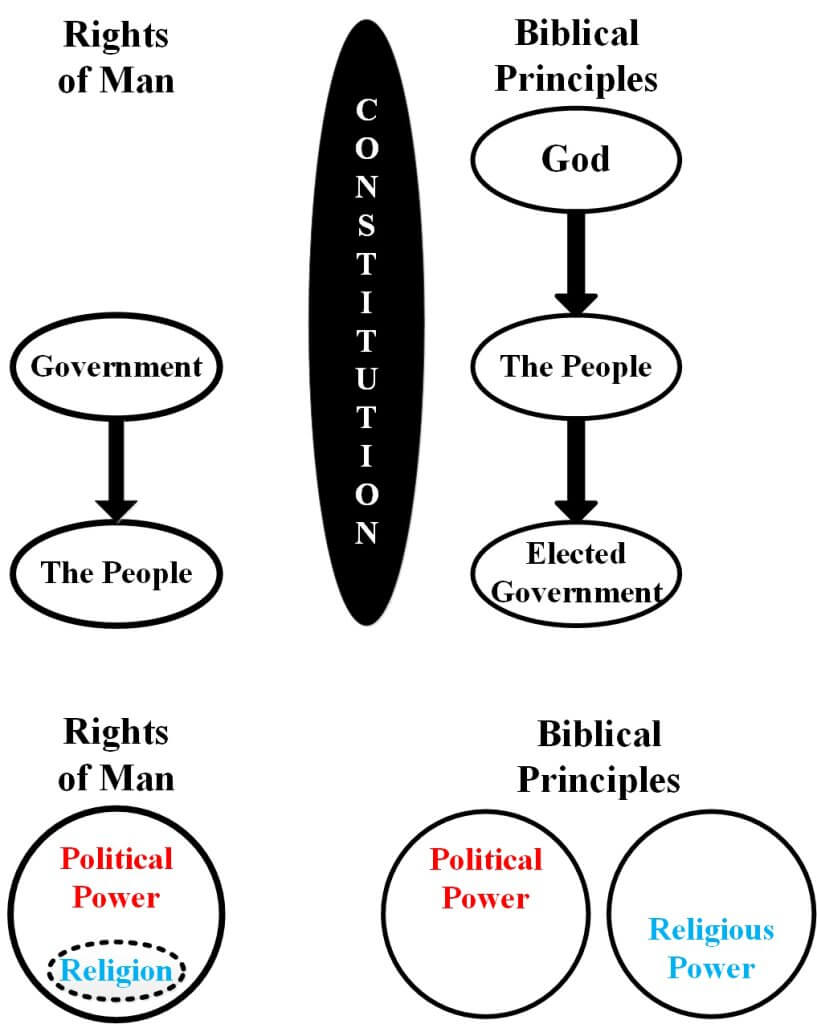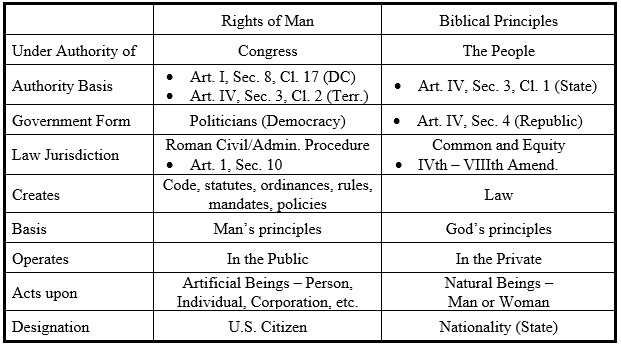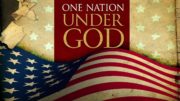Today we look at America’s founding. Was America founded as a Christian nation? If so, what does that mean? What are some implications? We’ll see in a later article the answers are central to the idea of Christian nationalism (CN) portrayed in our media. Further, those answers are colored by the governance model one puts their faith in. Yes, everyone has faith; it comes down to whether that faith is placed in God or man. Man places faith in God under the Biblical model, whereas under the pagan State Religion model man places faith in man.
What Is a Christian Nation?
Does this term mean that everyone must be a Christian? Maybe it means that America itself is defined by Christianity? Perhaps it means that Christians have a privileged position within society, and governance power must be used to preserve it. Those supporting the CN idea would likely answer yes to the preceding questions. However, they see the world through the lens of the State Religion model. Their societal view has multiple classes. Each class has its own privileges, and government’s role is seeing those classes are preserved. You see, rights are no longer inherent in our God-given nature. Instead they are privileges coming from man.
On the other hand, does being a Christian nation simply mean setting society up based on core principles derived from the Bible? Some foundational ideas for this approach were discussed last time. Only Israel of the Old Testament and America have been founded on those ideas. The rest of the world has chosen the other governance model, and everything coming with that choice.
We see one quick proof in the Constitution’s First Amendment. Religious freedom is mentioned first. This right forms our morality and defines our nature. Anyone can practice any religion they choose, so long as it does not impair another’s rights. There is no requirement to be a Christian for this, or any other, right. However, when it comes to societal issues effecting the people, those are governed by the same principles from America’s founding. Biblical principles; carried forward through natural and common law.
America’s Covenants
Just like ancient Israel, America made a covenant with God. Not just once, but at least three times. The first was the Jamestown landing in 1607. There America was dedicated to God. The first landing Covenant prayer is below.
“We do hereby dedicate this Land, and ourselves, to reach the People within these shores with the Gospel of Jesus Christ, and to raise up Godly generations after us, and with these generations take the Kingdom of God to all the earth. May this Covenant of Dedication remain to all generations, as long as this earth remains, and may this Land, along with England, be Evangelist to the World. May all who see this Cross, remember what we have done here, and may those who come here to inhabit join us in this Covenant and in this most noble work that the Holy Scriptures may be fulfilled.”[1]
Plymouth colony made the second in 1620. Originally intending to join the Jamestown settlement, they were blown off course. Outside their original charter area, they created America’s first constitution based upon the Biblical ideas of self-government.
The third covenant is our Declaration signed July, 1776.[2] This paper is a medieval document. Such documents had a specific structure and purpose. The Declaration’s opening section states certain Biblical ideas and principles. The second section lists their violation by Britain. The final section outlines the remedy. In short, this paper was a promise before God to create a government honoring the principles stated in the opening section. A promise fulfilled by our other founding documents.
Articles of Confederation
In addition to our Declaration, the Articles of Confederation, Northwest Ordinance, and Constitution comprise America’s organic law. All other law is inferior to the principles stated in these four papers, and to align with them.
The Articles were signed in 1777.[3] This paper is a pact between sovereign states (Articles I and II). It adopts common law principles and the people’s rights as Englishmen (Articles II and IV). Per Blackstone, these natural rights are integrated into common law. They include the private Rights of Personal Security (life), Personal Liberty (thought and action), Personal Property,[4] and Personal Relationships (family/household).[5]
Northwest Ordinance
The Ordinance was signed in 1787.[6] It defines policy for the territories; preparing them for becoming states equal with those already in the union (Section 13). Common law and some natural rights inherent in that law are found in Section 14, Articles 1 and 2. The importance and support of education in religion, morality, and knowledge is within Article 3 of the same section. The territories, and any states thereof, are subject to the Articles of Confederation in Article 4. This relationship is permanent. Finally, Article 6 states no slavery or involuntary servitude would exist within the territories.
Constitution
The Constitution was ratified in 1788 and the first ten Amendments added in 1791.[7] Within America, the people are sovereign.[8] The people granted certain powers to their states via their individual state Constitutions. The states in turn delegated a few powers (18 in Article I, Section 8 to be exact) to the new federal government. All granted powers were limited and related to international issues—things the individual states could not effectively do for themselves.
All four documents form links in a chain. None of them have been repealed. The Constitution forms the basis for our present federal government; with its three branches, checks and balances. There were a number of deficiencies in the earlier Articles of Confederation which the Constitution addressed. One was the Articles did not recognize Admiralty (civil) law. This law is all about contracts, and placed American merchants at a disadvantage in international commerce outside the united states. This was done in Article 1, Section 10, “No state shall . . . pass any . . . Law impairing the Obligation of Contracts.” This recognized the people’s unlimited power to contract.
Integrating both common and civil law created a governance model using both the Biblical and State Religion models. The people were intended to live under the constitution’s protection using common or equity law. Direct contact between the people and new federal government was rare, and required a contract—normally written using common law complying with all points noted in the first article. However, people could choose to enter the admiralty/civil law jurisdiction when it suited their purpose, such as operating in international commerce. This jurisdiction lay under the direct authority of congress as it had power over the federal district, territories, and international commerce.
America’s Governance Model
As noted above, within America the people are sovereign. The Constitution does not outline our rights. The Bible does that. Instead, the Constitution is intended to remind the federal government of its limits—with the people’s help. State or federal government sovereignty is recognition of equality with other nations under international law. A diagram of this relationship is presented below, but see the implications following it.
Note the State Religion governance model is replaced by one of its two variations, the Rights of Man model. This model is based upon the same ideas as its source, and comes out of the French Revolution. There is no god within this model, although government or man can become a god within these societies. The ruler is generally replaced by one or more governing bodies. Religion is subservient to political power within this model. The Rights of Man model forms the governance basis for most countries and the United Nations today.[9]


The Constitution creates a door allowing one to pass back and forth between the left and right side when it is advantageous to do so. This requires an education and understanding of basic law principles to effectively use. Unfortunately, such an education is no longer provided today.
Some Implications
The preceding model presents several implications, including;
- People submit their sovereignty to the federal government when operating under the left side. One trades their natural rights for man-made privileges.
- The people’s power to contract is unlimited. This gives us the power to contract ourselves out from under the Constitution, if we are not careful.
- Contracts and artificial beings (persons, corps., etc.) under the Rights of Man model use Roman civil law creating statutory (public) structures, whereas contracts and natural beings (man, woman, trusts, etc.) under the Biblical model create private structures using primarily common and equity law.
- Each side of the model has citizens of its own, with different rights/privileges, duties, and rules/law.[10]
So What Went Wrong?
So, was America founded as a Christian nation? Yes, from the perspective of using the Biblical governance model, its underlying ideas and principles. This is evident from our Founder’s citations in their works. From David Barton, about 65 – 70% of those came from just two sources; the Bible and Blackstone’s Commentaries on the Laws of England. Another 10% or so came from Montesquieu’s works. The rest is just bits and pieces. There is one class, one common set of rights, and one shared commitment for the common good. When those on the political left or the right say Donald Trump will destroy our democracy, they are speaking truth. I believe he intends to restore the republic.
How we arrived at this place today is our next topic. However, we’ll first make a side trip to cover some scripture that 19th century clergy believed referred to America, at least if one believes the Bible is God’s word.
Footnotes:
[1] First Landing 1607 Project, https://firstlanding1607.com/. Accessed Sept., 2024.
[2] National Archives, Declaration of Independence, https://www.archives.gov/founding-docs/declaration-transcript. Accessed Sept., 2024.
[3] National Archives, Articles of Confederation, https://www.archives.gov/milestone-documents/articles-of-confederation . Accessed Sept., 2024.
[4] Blackstone, Sir William, pp. 125-136, Commentaries on the Laws of England, Vol. 1, Clarendon Press, 1765.
[5] Ibid, pp. 410-454.
[6] National Archives, Northwest Ordinance, https://www.archives.gov/milestone-documents/northwest-ordinance . Accessed Sept., 2024.
[7] National Archives, The Constitution of the United States, https://www.archives.gov/founding-docs/constitution-transcript . Accessed Sept., 2024.
[8] There are many cases citing this principle. Some significant supreme court opinions are listed below and available from the Library of Congress, https://www.loc.gov , and in other places.
– Murphy v. Ramsey, 114 U.S. 15, 44, 45 (1885) – Territories
– Yick Wo v. Hopkins, 118 U.S. 356, 370 (1886)
– Downes v. Bidwell, 182 U.S. 244, 359 (1901)
– Broadrick v. Oklahoma, 413 U.S. 601, 620 (1973)
– Alden v. Maine, 527 U.S. 706, 706, 706 (1999)
[9] For more information see; Wolf, Dan, The Light & The Rod: Biblical Governance Corruptions, Living Rightly Publications, 2020.
[10] Some case law related to differing citizenships and rights, include;
Citizenship:
– People v. De La Guerra, 04 Cal. 311, 341, 342 (1870)
– United States v. Anthony, 24 Fed. 829, 830 (1873)
– United States v. Cruikshank, 92 U.S. 542, 549 (1875)
– Tashiro v. Jordan, 201 Cal. 236, 246 (1927)
– Kitchens v. Steele, 112 F.Supp. 383, 386 (1953)
– Crosse v. Bd. Of Supervisors 221 A.2d 431 (1966)
– United States v. Valentine, 288 F.Supp. 957, 979, 980 (1968) – Territories
Rights:
– Maxwell v. Dow, 176 U.S. 581, 597 (1900)
– Hale v. Henkel, 201 U.S. 43, 74 (1906)
– City of Dallas v. Mitchell, 245 S.W. 944 (1922)
– Terry v. Ohio, 392 U.S. 1, 9 (1967)



